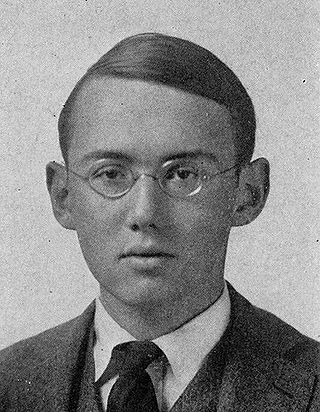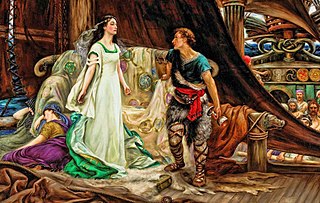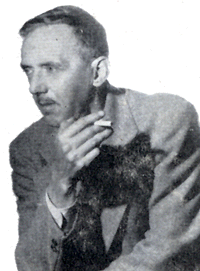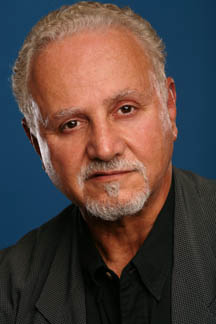
Horror is a genre of speculative fiction that is intended to disturb, frighten, or scare. Horror is often divided into the sub-genres of psychological horror and supernatural horror, which are in the realm of speculative fiction. Literary historian J. A. Cuddon, in 1984, defined the horror story as "a piece of fiction in prose of variable length ... which shocks, or even frightens the reader, or perhaps induces a feeling of repulsion or loathing". Horror intends to create an eerie and frightening atmosphere for the reader. Often the central menace of a work of horror fiction can be interpreted as a metaphor for larger fears of a society.

King Arthur, according to legends, was a king of Britain. He is a folk hero and a central figure in the medieval literary tradition known as the Matter of Britain.

William Cuthbert Faulkner was an American writer. He is best known for his novels and short stories set in the fictional Yoknapatawpha County, Mississippi, a stand-in for Lafayette County where he spent most of his life. A Nobel laureate, Faulkner is one of the most celebrated writers of American literature and often is considered the greatest writer of Southern literature.

Russian literature refers to the literature of Russia, its émigrés, and to Russian-language literature. Major contributors to Russian literature, as well as English for instance, are authors of different ethnic origins, including bilingual writers, such as Kyrgyz novelist Chinghiz Aitmatov. At the same time, Russian-language literature does not include works by authors from the Russian Federation who write exclusively or primarily in the native languages of the indigenous non-Russian ethnic groups in Russia, thus the famous Dagestani poet Rasul Gamzatov is omitted.

The Mabinogion are the earliest Welsh prose stories, and belong to the Matter of Britain. The stories were compiled in Middle Welsh in the 12th–13th centuries from earlier oral traditions. There are two main source manuscripts, created c. 1350–1410, as well as a few earlier fragments. The title covers a collection of eleven prose stories of widely different types, offering drama, philosophy, romance, tragedy, fantasy and humour, and created by various narrators over time. There is a classic hero quest, "Culhwch and Olwen"; a historic legend in "Lludd and Llefelys", complete with glimpses of a far off age; and other tales portray a very different King Arthur from the later popular versions. The highly sophisticated complexity of the Four Branches of the Mabinogi defies categorisation. The stories are so diverse that it has been argued that they are not even a true collection.

Stephen Vincent Benét was an American poet, short story writer, and novelist. He wrote a book-length narrative poem of the American Civil War, John Brown's Body, published in 1928, for which he received the Pulitzer Prize for Poetry, and for the short stories "The Devil and Daniel Webster", published in 1936, and "By the Waters of Babylon", published in 1937.
Collage novel is used by different writers and readers to describe three different kinds of novel: 1) a form of artist's book approaching closely the graphic novel; 2) a literary novel that approaches "collage" metaphorically, juxtaposing different modes of original writing; and 3) a novel that approaches collage literally, incorporating found language and possibly combining other modes of original writing.

Jean Stafford was an American short story writer and novelist. She won the Pulitzer Prize for Fiction for The Collected Stories of Jean Stafford in 1970.

Fantasy literature is literature set in an imaginary universe, often but not always without any locations, events, or people from the real world. Magic, the supernatural and magical creatures are common in many of these imaginary worlds. Fantasy literature may be directed at both children and adults.

As a literary genre, the chivalric romance is a type of prose and verse narrative that was popular in the noble courts of high medieval and early modern Europe. They were fantastic stories about marvel-filled adventures, often of a chivalric knight-errant portrayed as having heroic qualities, who goes on a quest. It developed further from the epics as time went on; in particular, "the emphasis on love and courtly manners distinguishes it from the chanson de geste and other kinds of epic, in which masculine military heroism predominates."

Tristan and Iseult, also known as Tristan and Isolde and other names, is a medieval chivalric romance told in numerous variations since the 12th century. Of disputed source, usually assumed to be primarily Celtic, the tale is a tragedy about the illicit love between the Cornish knight Tristan and the Irish princess Iseult in the days of King Arthur. It depicts Tristan's mission to escort Iseult from Ireland to marry his uncle, King Mark of Cornwall. On the journey, Tristan and Iseult ingest a love potion, instigating a forbidden love affair between them.

Elements of the supernatural and the fantastic were an element of literature from its beginning. The modern fantasy genre is distinguished from tales and folklore which contain fantastic elements, first by the acknowledged fictitious nature of the work, and second by the naming of an author. Authors like George MacDonald (1824–1905) created the first explicitly fantastic works.

Harold Lenoir Davis, also known as H. L. Davis, was an American novelist and poet. A native of Oregon, he won the Pulitzer Prize for his novel Honey in the Horn, the only Pulitzer Prize for Literature given to a native Oregonian. Later living in California and Texas, he also wrote short stories for magazines such as The Saturday Evening Post.

Modernist literature originated in the late 19th and early 20th centuries, and is characterised by a self-conscious separation from traditional ways of writing in both poetry and prose fiction writing. Modernism experimented with literary form and expression, as exemplified by Ezra Pound's maxim to "Make it new". This literary movement was driven by a conscious desire to overturn traditional modes of representation and express the new sensibilities of the time. The immense human costs of the First World War saw the prevailing assumptions about society reassessed, and much modernist writing engages with the technological advances and societal changes of modernity moving into the 20th century. In Modernist Literature, Mary Ann Gillies notes that these literary themes share the "centrality of a conscious break with the past", one that "emerges as a complex response across continents and disciplines to a changing world".

Felice Picano is an American writer, publisher, and critic who has encouraged the development of gay literature in the United States. His work is documented in many sources.

A novel is an extended work of narrative fiction usually written in prose and published as a book. The English word to describe such a work derives from the Italian: novella for "new", "news", or "short story ", itself from the Latin: novella, a singular noun use of the neuter plural of novellus, diminutive of novus, meaning "new". According to Margaret Doody, the novel has "a continuous and comprehensive history of about two thousand years", with its origins in the Ancient Greek and Roman novel, Medieval Chivalric romance, and in the tradition of the Italian Renaissance novella. The ancient romance form was revived by Romanticism, in the historical romances of Walter Scott and the Gothic novel. Some novelists, including Nathaniel Hawthorne, Herman Melville, Ann Radcliffe, and John Cowper Powys, preferred the term "romance". Such "romances" should not be confused with the genre fiction romance novel, which focuses on romantic love. M. H. Abrams and Walter Scott have argued that a novel is a fiction narrative that displays a realistic depiction of the state of a society, while the romance encompasses any fictitious narrative that emphasizes marvellous or uncommon incidents. Works of fiction that include marvellous or uncommon incidents are also novels, including Mary Shelley's Frankenstein, J. R. R. Tolkien's The Lord of the Rings, and Harper Lee's To Kill a Mockingbird.
John Sanford or John B. Sanford, born Julian Lawrence Shapiro, was an American screenwriter and prose writer who wrote 24 books. The Cambridge Companion to Jewish American Literature describes him as, "Perhaps the most outstanding neglected novelist." A one-time member of the Communist Party, after he and his wife Marguerite Roberts refused to testify to the House Un-American Activities Committee, they were blacklisted and unable to work in Hollywood for nearly a decade.
Five ancient Greek novels or ancient Greek romances survive complete from antiquity: Chariton's Callirhoe, Achilles Tatius' Leucippe and Clitophon, Longus' Daphnis and Chloe, Xenophon of Ephesus' Ephesian Tale, and Heliodorus of Emesa's Aethiopica. There are also numerous fragments preserved on papyrus or in quotations, and summaries in Bibliotheca by Photius, a 9th-century Ecumenical Patriarch. The titles of over twenty such ancient Greek romance novels are known, but most of them have only survived in an incomplete, fragmentary form. The unattributed Metiochus and Parthenope may be preserved by what appears to be a faithful Persian translation by the poet Unsuri. The Greek novel as a genre began in the first century CE, and flourished in the first four centuries; it is thus a product of the Roman Empire. The exact relationship between the Greek novel and the Latin novels of Petronius and Apuleius is debated, but both Roman writers are thought by most scholars to have been aware of and to some extent influenced by the Greek novels.

Ventseslav Konstantinov was a Bulgarian writer, aphorist and translator of German and English literature.

Stephen Koch is a novelist, essayist, historian and teacher. He has written numerous books of cultural history, two novels, and a classic study of the work of Andy Warhol. He has taught creative writing at both the undergraduate and graduate levels at Columbia University and Princeton University. He is also the author of a handbook for writers, The Modern Library Writer's Workshop.
















